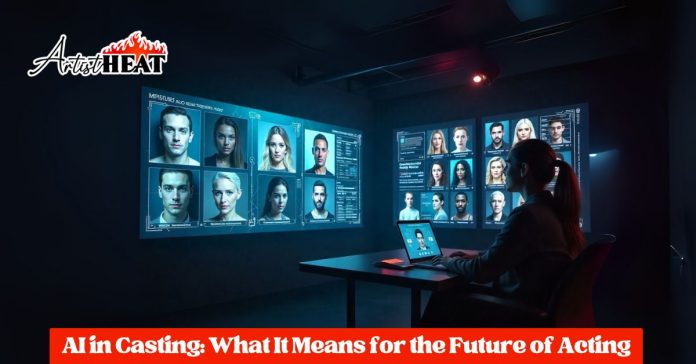Just imagine you are surfing through your Netflix and you decide to binge-watch your favorite series, but then you realize that hot leading actor or actress might have never been a choice of a human casting director. Rather, a computer program went through thousands of headshots, voice recordings and even micro-expressions in concluding that they were the right match. Welcome to 2025, where AI in casting is reshaping Hollywood faster than you can say “action!”
Ever since the inception of the entertainment industry it has been about casting a face in the right part, but artificial intelligence is today taking the place of the casting director. This technological revolution is not only affecting the way actors were discovered, but it is actually transforming the definition of what is an actor in a digital world. We ought to enter this new brave world where silicon and stardom meet.
The Current State of AI-Powered Casting
Gone are the days when casting was purely about gut instinct and human intuition. Today’s AI in casting systems can process thousands of audition tapes in minutes, analyzing everything from facial symmetry to vocal patterns. Such companies as Casting Networks and LA Casting have incorporated machine learning programs that may pair actors up with parts according to incredibly precise criteria.
These systems no longer only consider the conventional aspects such as a person/s age and looks. They are working on speech patterns, the range of emotions and even forecasting audiences before an actor starts. It is equivalent to a crystal ball without the mystic powers but based on data and computing power.
This has made technology so advance to the extent that there are AI systems that are capable of predicting the on-screen chemistry actors will flow onto together long before they have even met. These algorithms will be used to make casting decisions that would otherwise have required weeks of follow-ups and screen tests based on analysis of facial traits, body language, vocal compatibility, etc.
How AI is Transforming the Audition Process
Can you recall those days when actors had to literally appear at the auditions and in some cases stand in queue for hours only to be allowed a thirty-second reading? Those were days that are very fast turning to be a thing of the ancients. AI in casting has digitized and streamlined the entire process, making it both more efficient and, surprisingly, more accessible.
With the help of AI, virtual auditions are capable of evaluating the performance of an actor in real-time. The tech checks the delivery, time, authenticity level of emotion and even minor facial expression that might be missed in the eyes of human beings. Stars such as Zendaya and Timoth Chalamet who became famous in the course of this digital shift have had the advantage of a system that was able to appreciate their individual talents beyond papal Hollywood box.
The self-tapes are not limited to the mere uploading of the video anymore as actual execution is scrutinised by intelligent AI. They are able to measure consistency throughout several takes, determine an actors skill to take direction (by comparing different versions of the same scene) and even analyze their improvisational aptitude.
The Benefits: Efficiency Meets Opportunity
Come on, we all know that original casting has always been a nightmare in some sense. Behind each actor who was cast in his or her dream role, you have thousands of other actors who were rejected due to an arbitrary reason perhaps having nothing to do with his or her ability at all. AI in casting is democratizing the process in ways we never thought possible.
Physical boundaries are falling down. A country actor in Montana can also get the chance to audition on a huge Netflix show just like the one in Los Angeles. The robot does not give a damn about your zip code but solely the job it will do. This has resulted in the wider casting choices and the reveal of talent that would have otherwise gone hidden.
The speed variable is the revolutionary one. Casting directors can now do what initially took them months to do in weeks. This efficiency is an advantage to the actors as they are given more opportunities to be employed since productions will be in a position to consider more pools of talents without the fantastic costs of traditional casting procedures.
Certain types of bias are also being minimized by decisions that are data-based. Although AI is not a perfect solution, it will be able to remove certain human biases and considerations based on personal relationships or influences of politics in the industry to instead focus on the performance indicators. Actors such as John Cho and Riz Ahmed have addressed the fact that algorithmic casting has created opportunities that a combination of traditional gatekeepers could have closed to them.
The Dark Side: What We’re Losing in Translation
But here’s where things get a bit murky, and I’m not going to sugarcoat it. AI in casting isn’t all red carpets and standing ovations. Some of these implications really are alarming and there are several questions to consider about the industry as we completely give the keys to our robot overlords.
There is a very human element that makes magic in casting, and this is being taken systematically away. The spark, the unexpected decision and the actor that defies a type yet still has such command of the role, these are all things that algorithms find more difficult to identify. Others have been the best performance in cinemas ever made by unexpected casting opportunities in which an AI would have immediately avoided.
It is also the problem of algorithmic bias. Although AI is likely to decrease certain types of human bias, it can be used to both reproduce and augment existing biases that are already included as training data. In case the system is educated about decades of historically homogeneous casting trends in Hollywood, it could still choose to give advantage to some of its demographics, applying the claim that it is being objective.
The possibility of privacy being compromised is also on the rise as more detailed information is gathered in these systems regarding the looks, sounds and performances of actors. This data will be stored on permanent online profiles that may accompany actors all through their lives so limiting them to reinvent themselves or play different roles.
Case Studies: Success Stories and Cautionary Tales
The results of AI in casting have been mixed, creating both breakthrough opportunities and notable controversies. Apart from maximizing ROI, AI-based casting that Netflix used when making Stranger Things, was able to discover some of the young actors who could have easily been dismissed in a classic audition, giving them life-defining roles.
In their turn, some independent films have been criticized due to AI-assisted casting decisions that appeared to be prioritizing compatibility with the algorithm and neglecting the artistic direction. A well-known, yet extreme example was a scenario when an AI presented the same category of actors to multiple characters despite their varying demands as it still lacks details of the particular character demands.
The significant streaming platforms are currently spending vast sums on their own casting AI, and Amazon Prime and Disney+ are building systems ready to estimate viewership activity by casting decisions. Initial performances indicate that such algorithms are increasingly becoming incredibly accurate at predicting commercial success, however, critics believe that such metricization-focus may put a damper on artistic risk-taking.
The Future Landscape: What’s Coming Next
Looking ahead, AI in casting is poised to become even more sophisticated and pervasive. Virtual reality auditions will arrive, where the performer may be able to act in a digitally realized space, and casting directors could view the manner of interaction with CGI or a certain set design prior to filming.
The usage of deepfakes and AI-generated acting is causing concern about the nature of acting in general. What does this mean to the art of acting when an algorithm can simulate a convincing performance using only a small number of reference videos? There are suggestions among some industry experts that we are going to have hybrid schemes where Artificial Intelligence (AI) will augment human performances and not replace them as a whole.
Another activity that is becoming common is the analysis of the performance of the filming in real-time. Tests are being performed on large productions on the use of AI systems to give immediate feedback on takes, recommendations on how they can be improved, and even predict reception of scenes in audiences.
Navigating the New Reality
For actors entering the industry today, understanding and adapting to AI in casting isn’t optional – it’s essential for survival. The most effective actors are being taught to collaborate with these systems, not battle with them, doing their best to optimize their self-tapes to comprehension by the algorithm, but not losing their artistic integrity.
There too are new standards of ethics and rules within the industry that the industry is struggling to contend with. There are transparency requirements being pressured by several actors unions including asking performers to receive notice when an AI is being deployed in castings and subsequently requesting to know what the algorithms use.
Actors are being trained to learn how to come out to the audience in a compelling manner that satisfies human and machine judges. This covers all the aspects of lighting conditions in which AI facial recognition is most optimal, to speaking patterns that are perceived by the algorithm as assertive and interested.
An actor, in any case, may need to gain a new form of versatility in the era of casting in the world of artificial intelligence, mingling talent with the technological understanding and expertise. The forces of innovation will work against the firmly committed performers, leaving only those who can adjust to the hybrid environment and stay human to succeed to find room in this brave new world.
As we stand at this crossroads between tradition and innovation, one thing is certain: AI in casting is here to stay. The big question is not will it transform the industry but how will we make the technology a tool to the creativity and not a substitute to the creativity. The Internet is not absent, and instead of a human eye, it remains under the spotlights that are driven by algorithms more than it is by inspiration.

